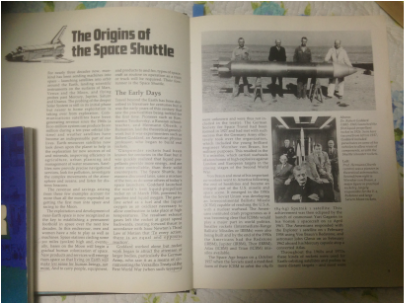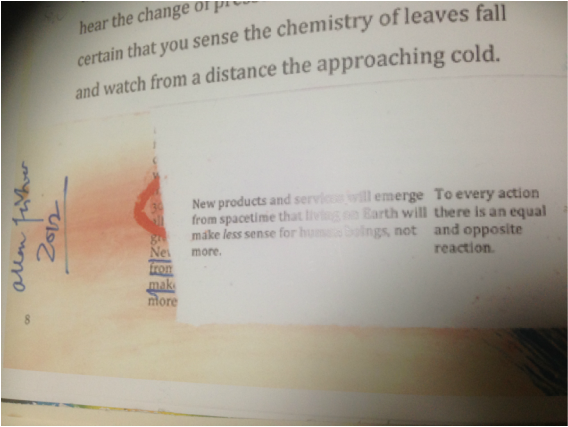|
Read SPUTTOR (3) here If most journeys begin with a sense of anticipation, then the first recognizably ‘poetic’ lines in SPUTTOR register an immense anxiety. Rocketry isn’t encountered in terms of fascination and wonder but an intense aerophobia. We are launching into an arena the very opposite of the ‘space race’. SPUTTOR struggles to articulate a position beyond the rhetoric of the cold war. The poetry itself is Fisher’s own text as it has been transposed onto Wilson’s original. There is a handwritten signature, as well as the interference of paint and image, but interpretation seems to coalesce around the damage initiated by the artist himself. Fisher’s text is pasted over Wilson’s dealings with the ‘origins’ of the Space Shuttle Program, as if the conceptual foundations of SPUTTOR are developing in tandem. The first fragment of text reads as follows: Afraid of nothingness as a possibility afraid for the loss of the ever new gift of Being whatever gives fullness without end lost in the uncertainty and obscurity of history lived in common with other great nations afraid of nothing not even oblivion or the dross of history's rift without feeling whoever's gift pulls shout a stipend (8) This is a moment of embarkation. But as readers there is no sense we are voyaging into the unknown. The repetitions, especially of ‘afraid’, are the kind of ‘SPUTTORings’ that emerge from being wedged in our perilous socio-political condition. ‘Human anticipation’ cannot progress beyond the stasis of our dystopian moment. The poetic journey in SPUTTOR unfolds directly in front of us, marking a territory that is both familiar and stifling. ‘History’ and ‘loss’ are prefigured in all such poetic imaginings. The aesthetic flounders, caught up in its failure to tackle the immensity of what lies ahead. The writing points to a fear ‘of nothingness’ but also a fear ‘for/ the loss of the ever new gift of Being’. This isn’t just a fear for humanity in the present, but for the death of the creative impulse projected into the future. There is a symbiotic relationship emerging between the health of the public sphere, and what Fisher has previously called an ‘efficacious aesthetics’ (Confidence in Lack, 2007, 17). ‘Loss’ doesn’t simply refer to the negative potential of the present moment, but something involved in aesthetic function. ‘[A]ll experience, existence and memory, involves loss’, Fisher explains in Traps or Tools and Damage (2010), ‘that is, it involves damage’ (21). ‘Loss’ is a trigger for creating transformations in the first place. In the process of ‘healing’ new situations emerge. In human anticipation the cycles of ‘history’ are positioned as ‘obscurity’, instead of the exposition of fact. Rather than moving forward with statements of veracity, Fisher’s text proceeds with a truncated rhythm shifting through various phases of doubt. The rhyming of ‘end/ stipend’ ,and ‘for/ or’, are formal traces towards poetry in the traditional sense. But this first segment of writing also seems to morph a little as it progresses. Seen in conjunction with the image mentioned previously, and the text at the bottom of the left hand page, the general tone changes quite radically by line six. Suddenly the narrator is ‘scared of nothing’, and the all-consuming site of history is manifest as ‘dross’, something subject purely to economic motivations or the ‘pull’ of ‘stipends’. As early as line four the word ‘history’ is itself damaged by an intentionally heavy brush of blue paint. This blue gives another timbre to the spiraling sense of disaster. History isn’t simply as written – the communication of singular didactic imperatives – but the origin of possibilities coterminous with the intangible aspects of the sky. Instead of dominating history through technological innovation, it is almost as if a more ecologically-minded consciousness pokes through the veneer. This isn't the hope for ‘origins’, however, but a determined account of actual social conditions. There is an even more consciously damaged section readily apparent on the left hand page. Here, Fisher draws attention to a passage of Wilson’s text, not simply by painting over it but underlining sections and scoring heavily in red on top. This section has been pasted over with words that seem like Fisher’s own, but are actually a slightly adapted version of the underlined section of Wilson’s text obscured under Fisher’s own pasting. Wilson’s damaged text appears juxtaposed exactly as it does in the pagination of the original:
New products and services will emerge To every action from spacetime that living on earth will there is an equal make less sense for human beings, not and opposite more. reaction (8) These lines are intentionally damaged by the artist, and deliberately re-presented, in a seeming attempt to foreground an example of the kind of ‘transformations’ that will be relied on in the following text. With minimal authorial interference – save the changing of ‘space’ to ‘spacetime’ and a handwritten signature reading ‘Allen Fisher 2012’ – the smallest changes to the content are seen as responsible for re-orientations in the material as it becomes distinct from Wilson's original. At this juncture in Space Shuttle Story ‘the human colonization of space’ is presented as a place where ‘taking a shuttle’ in the future would be as ‘routine’ as catching a ‘bus’. This belief in the positive benefits of technology remains wholly in line with the unshakable belief in ‘human progress’ synonymous with the ‘space race’. But the ‘products and services’ seen emerging from ‘spacetime’ in Fisher’s conception – a ‘spacetime’ which renders ‘history’ as an ‘obscurity’ rather than something to be ‘colonized’ by technology as in Wilson’s account – are of a different variety entirely. Newton’s law of action and reaction isn’t significant just in terms of the ‘forward thrust’ of Robert Goddard’s early experiments in rocketry as it was for Wilson, but holds a more complicated relationship to the damaged material. The ‘products and services’ emerging from ‘spacetime’ make 'less sense' for humanity due to alternative reasoning. There is a complicity identified between the positive benefits of technology and its capacity for violence. The only words legible from Wilson’s original are ‘rockets’ and ‘weapons’, as if there are implicit links being made between Wilson’s ‘products and services’ and the military industrial complex. Rocketry may have enabled air travel in the domestic sphere, but this was only the tip of a particularly nasty iceberg. Even though this technology provides humanity with benefits, its utilization is largely senseless. Bombs that are dropped in Palestine have an equal and opposite reaction in the heightened state of terror on the home front. The fact that Fisher’s suitcase across the page is being x-rayed attests to this fairly simple law of physics. The ‘new products’ and ‘services’ that are meant to benefit us, are appropriated for much more grizzly ends. Wilson’s text – seemingly innocuous, from the withdrawn sale at a public library – is complicit in global networks of violence the exact opposite to the utopia proffered by Space Shuttle Story. Wilson’s text identifies ‘The Origins Of The Space Shuttle’ as a consequence of the technological innovations of the Russian, American and Nazi states. Werner Von Braun, an Nazi engineer fundamental in the genesis of the V2 rocket that maimed countless English civilians in the final stages of the Second World War, is actually shown to have been poached by American authorities ‘following the end of hostilities’ (9). What these initial pages of SPUTTOR seem to be proposing is a form of writing that tries to avoid the complicity of language in duplicitous projects such as these. The second section of Fisher’s poem, then, noticeably changes in tone: the cost in propensity and poverty of mystery riven in community and the bother to eat rations Imagine you feel the Moon through the wall and your brain hear the change of pressure and temperature freeze the grass certain that you sense the chemistry of leaves fall and watch from a distance the approaching cold (8) These lines are wider as we feel the ‘change of pressure’ and the ‘gravity’ – not only another fundamental Newtonian law but Fisher’s former text – of ‘leaves fall[ing]’. This ‘journey’ has suddenly become much more edifying, as we leave our doomed planet to watch the ‘approaching cold’. This isn’t simply a journey into space, but instead an attitude, or ‘awareness’, the writer is asking us to adopt as an approach to reading. Life on earth is in peril, and to discover ‘our situation’ – as originally intended all those years ago in Place – we have to experience our insignificance. On the remaining pages of the ‘human anticipation’ section of Fisher’s text (10 -11), attention is drawn to statistical data from Nicolaus Copernicus’ On the Revolution of Heavenly Spheres (1543) as if to emphasize this fact. This new Copernican Revolution is important because it questions that ‘foolish belief’ in the ‘permanence of the self’ noted in the forewords section. Juxtaposed with a quotation from Foucault’s The Courage of Truth (2011), Fisher claims his right of Parrhesia. Traditionally existing to rejuvenate the polis, by talking the truth to power, we can perhaps see this as an attitude that will pervade the following work. The poet will be engaged in the coming pages with a form of speaking aimed at reclaiming, and reinvigorating, the idea of citizenship. It may seem formally unorthodox, but there are new aesthetic techniques being tested out in SPUTTOR to this end. Parrhesia will be the starting point of my penultimate post, but for now Fisher's attempt at utterance is directly opposed to the worn out narrative occupying Space Shuttle Story. |
Categories
All
Archives
April 2023
|


 RSS Feed
RSS Feed
